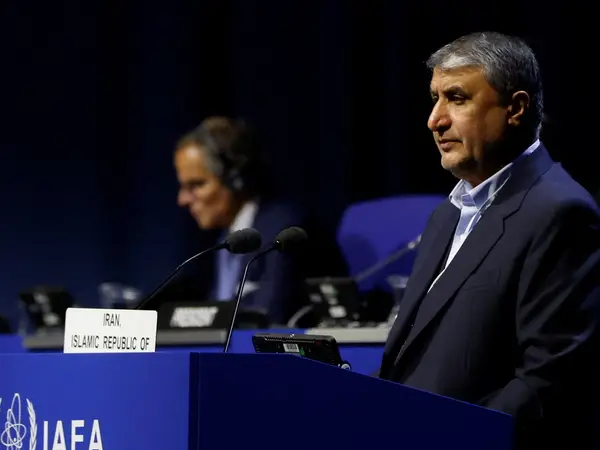Rafael Mariano Grossi, head of the United Nations nuclear agency, will continue talks with Iran over the agency probe into uranium traces in undeclared sites.
Grossi is due to sit down later this week with Mohammad Eslami, head of the Atomic Energy Organization of Iran, after the two met Monday on the side-lines of the annual conference of the UN’s International Atomic Energy Agency (IAEA) in Vienna. Alongside a picture of the two shaking hands, Grossi tweeted that “dialogue has restarted with Iran on clarification of outstanding safeguards issues.”
Monitoring ‘safeguards’ commitments of state signatories of the Nuclear Proliferation Treaty is a central IAEA function but in Iran’s case has become entangled in negotiations to revive the 2015 Iran nuclear agreement, the JCPOA (Joint Comprehensive Plan of Action).
Whereas Tehran has argued the IAEA ‘safeguards’ probe into the uranium traces, relating to work before 2003, should be dropped as part of JCPOA revival, the United States and three European JCPOA signatories have said it must continue until Iran’s answers satisfy the agency.
Grossi told the IAEA annual conference that the investigation was “not going to go away.” Eslami told the conference the probe was based on “false, baseless information,” referring to its origins in allegations made by Israel in 2018 at the time President Donald Trump pulled the US out of the JCPOA and imposed ‘maximum pressure’ sanctions on Iran.
‘Baseless allegations’
Iran’s foreign minister Hossein Amir-Abdollahian told al-Monitor Sunday that Tehran was “ready to provide answers” over the uranium traces, found at three sites undeclared as nuclear-related, as long as the agency behaved “technically” rather than politically.”
Abdollahian reiterated that Iran expected the agency to drop “baseless allegations” before the JCPOA could be restored, and called for “political will to close the case.” He repeated Iran’s claim of a precedent from 2015, when the IAEA produced a ‘final’ report into possible military dimensions of Iran’s nuclear program before 2003.
The foreign minister also pointed out that with the JCPOA restored, the agency would have access to the Iranian nuclear program “beyond safeguards.” Under the 2015 agreement Iran to implemented the ‘Additional Protocol,’ which added to the IAEA’s monitoring powers and obliged Tehran to accept the IAEA access needed to vouchsafe JCPOA implementation.
Grossi, who referred Monday to the “need to find a common solution,” may accept that the greater agency powers under a restored JCPOA could help the agency investigate the uranium traces. He told NPR in an interview in late August: “If the IAEA is allowed to do our inspection work, we are going to get there – I’m pretty confident.”
On another challenge facing JCPOA talks, Amir Abdollahian told al-Monitor that “some progress” had been made in recent weeks in messages exchanged with the US over Tehran’s demand for ‘guarantees’ it would be cushioned economically should Washington subsequently withdraw from a restored JCPOA.
On regional tensions, Amir-Abdollahian said he last week had discussions with Iraqi foreign minister Fuad Hussein over next steps in Baghdad-mediated contacts designed to return to “normal” Iran-Saudi Arabia relations with reopening of embassies. Formal ties were broken off in 2016 after protestors in Tehran attacked the Saudi embassy following the Saudi execution of Shia cleric and opposition figure Nimr al-Nimr.
